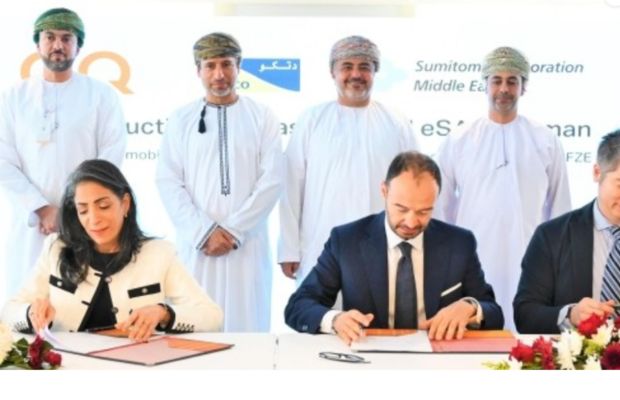Parties comprising OQ Alternative Energy (OQAE) – an OQ Group company, Dutco, Sumitomo Corporation Middle East FZE, Automobili Lamborghini SpA, and Airbus have formed the OSCAR (Oman Sustainable Cars and Aviation Refuelling) consortium to study the potential of Oman for the production of e-gasoline and e-SAF (Sustainable Aviation Fuels).
The concept study will explore the production of e-fuels (E-SAF and E-Gasoline) in Oman on a pilot scale with the possibility to scale it up to a commercial-size project at a later stage by identifying the most appropriate pathway for production from qualifying hydrogen and CO2 sources.
The joint study agreement was signed, in the presence of Eng Salim Nasser al Aufi, Minister of Energy and Minerals, Said bin Hamoud al Mawali, Minister of Transport, Communications and Information Technology, Eng Naif Ali al Abri, Chairman of Oman’s Civil Aviation Authority, and Ashraf bin Hamed al Mamari, Acting Group CEO of OQ. It was signed by Najla al Jamali, Chief Executive of OQ Alternative Energy; Ahmad Sharaf, CEO of Dutco’s Energy Division and attended by Sami Kamel, CEO of Dutco’s Cleantech Division; Rutigliano Stefano, Strategy Director at Automobili Lamborghini; Hideki Suruga Deputy CEO and CFO of Sumitomo Corporation Middle East FZE; and Mikail Houari, President Airbus Africa and Middle East.
Additionally, OQ Alternative Energy and Tree Energy Solutions (TES) have entered into a Joint Study Agreement to assess the development of an electric natural gas (e-NG) facility in Oman. The agreement was signed by Najla al Jamali, Chief Executive of OQ Alternative Energy, and Marco Alverà, CEO and Co-Founder of TES.
Oman has been at the forefront in the development of a green hydrogen economy, aiming to produce over 1 million tonnes per annum of green hydrogen by 2030. The country’s abundant renewable resources, in particular wind and solar, combined with a one-stop-shop implementation framework under Hydrom’s directive, has been promoting Oman to be amongst the most promising green hydrogen production hubs in the region.
e-NG, a green hydrogen-based molecule, is chemically identical to natural gas. It is produced by combining green H2 with CO2 through a methanation process known as Sabatier, resulting in the production of green CH4. This process leverages existing infrastructure for liquefaction, regasification, transportation and storage. Importantly, it offers a seamless transition for industrial usage, gradually replacing natural gas.


